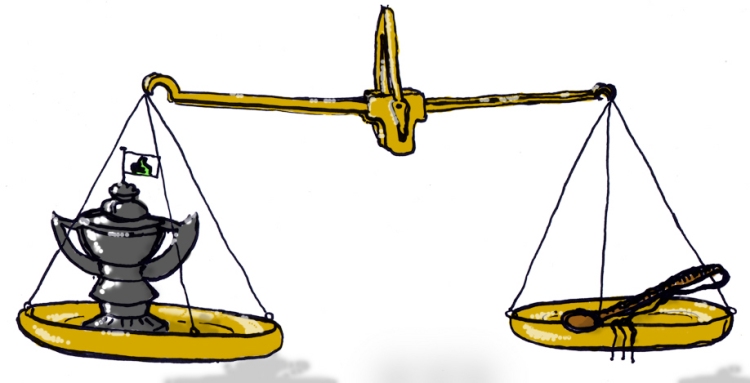
The other topic atheism wants to abolish, is divine sanctioning. Believers cannot imagine, that nothing comes after death. Every religion promises some form of life after death, either in a new world, or within the universe we know. Sanctioning behavior and intentions, good as well as bad, during life by the divine power or divine judge, is seen as an essential settlement. The aim of life and its meaning is improvement of position in the hereafter within a divine plan. Atheists, as rejectors of a divine plan and divine judgement, see this as an invention of power–greedy politicians to legitimize their position. Man's striving for power and rankings is in their view a biological selection-mechanism from which the strongest specimens triumph and survive in the end. Exercising power for power itself is another important motive for exercising religious dominance over others, according to many. Godly sanctions are as much a human invention as God himself, even when the intentions were decent. In the non-religious view, religion in the best sense of the word is a regulating, civilizing institution meant to avoid chaos in a society that gives little room to empirical, technological knowledge gathering.
The main item that non-religious people campaign against, is legal sanctioning of behavior, as part of a life based on religious scriptures and religious ideas. How can a human–invented authority impose limitations and penalties on living people? The usefulness of the sanctions is not the issue here.
For believers, however, divine sanctioning has a more complex, differentiated meaning, as determined by their creed. Sanctioning in the hereafter means in religions the final settlement of injustice or of negligence people may get away with in the present life, and 'now' the good ones aren't always properly rewarded for their good actions. Some religions consider divinely–inspired punishment carried out by people as a purification before the hereafter comes.
A special, complex place is reserved for divine sanctioning in the present life. The religions give their own answers to events like natural disaster, illness, death at young or at quite old age, but also to difference in wealth, intellect, race, or species. What is either underdevelopment, or its opposite, high development, to man – a punishment, a reward or a test? We can ask ourselves these same questions for dumbness, red hair, or for achievements that are highly valued – or, contrarily, that are considered highly destructive. Can we say that wealth and intellect are divine rewards – a proof that He has better intentions for the person blessed with them than for the disabled, sick slum inhabitant? Or is it the other way round? To what extend can we see living conditions, events, and people's natural abilities as God's work? A believer answers according the scriptures he or she adheres to, but also according his or her own philosophy. The vicissitudes of destiny cause the differences between people, which is sometimes seen in a negative way, and sometimes as a task to assume responsibility for each other as a community. Where non-believers reject any divine role in events, believers have – according their creed – specific answers to this question: Is God good, does God want good for mankind? The answer is not uniform. However, we see in every religion a connection between God's judgement and man's reaction to good or bad luck, as well as specific recommendations or tasks on how a believer should react to good or bad luck. Good and bad luck are part of the examination task for man.
In cases where high emphasis is put on divine sanctioning, religion poses high demands on the faithful. We may call a faith 'strict', when it strives for justice. It introduces aims and rules for behavior and for intentions, all with appropriate sanctions. The fewer second chances are possible, the more important becomes obedience to the rules. Islam acknowledges only one chance: This life. It will be judged, and we hear whether we go to paradise or to hell. Hinduism acknowledges reincarnation: The next life offers a new chance for improvement. The most liberal forms of religion, which we can find among several Protestant churches, do not acknowledge any negative sanctioning in the hereafter. Such easygoing faith doesn't strive for bringing law and order, nor does it pose demands on society and politics, and it doesn't need a forceful reigning god. The influence of religion on society should be limited, and faith is a binding emotional value rather than a source of guidance. There is an interesting aspect to liberal faith: Why, and on who's authority, have negative sanctions been abolished? One may wonder whether the adherents want to drive out the darkness for another reason: Fear. The big punishing snowman doesn't exist when we close the curtains. Does it work? Or is it arbitrary one-sidedness, for one. It is impossible to dogmatize about it, since we can't see what's in store for us.
Some religions see a connection between social and economic position, on the one hand, and divine sanctioning, on the other hand. Hinduism has a clear and simple view: Those who did well in the previous life, now enjoy a high position in society, and those who didn't, may now have returned as animals or as low–ranking people. Some Protestant schools of thought believe that good or bad behavior has no influence on our fate in the hereafter; they think that our behavior and fate in the hereafter are determined before birth. Islam abstains from a moral judgement on social-economic position and on good or bad luck. It emphasizes the way the faithful handle these events and these living conditions. A believer is always grateful and loving; punishment can also imply purification leading to a better afterlife.
Comments
Post a Comment